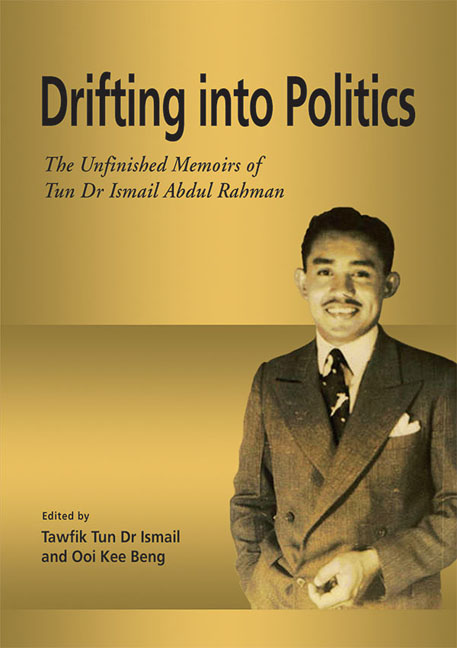Book contents
- Frontmatter
- Contents
- Preface
- INTRODUCTION
- CHRONOLOGY of Tun Dr Ismail bin Datuk Haji Abdul Rahman's Life (From The Reluctant Politician)
- REVIEW of The Reluctant Politician: Tun Dr Ismail and His Time (From Journal of the Malaysian Branch of the Royal Asiatic Society)
- Drifting into Politics: The Unfinished Memoirs of Tun Dr Ismail Abdul Rahman
- Chapter One
- Chapter Two
- Chapter Three
- Chapter Four
- Chapter Five
- Chapter Six
- Chapter Seven
- Chapter Eight
- Chapter Nine
- Chapter Ten
- Chapter Eleven
- Chapter Twelve
- Chapter Thirteen
- Chapter Fourteen
- Chapter Fifteen
- Chapter Sixteen
- Further Notes (30 March 1970)
- Further Notes (26 October 1972)
- Index
- About the Editors
Chapter Fifteen
from Drifting into Politics: The Unfinished Memoirs of Tun Dr Ismail Abdul Rahman
Published online by Cambridge University Press: 19 May 2017
- Frontmatter
- Contents
- Preface
- INTRODUCTION
- CHRONOLOGY of Tun Dr Ismail bin Datuk Haji Abdul Rahman's Life (From The Reluctant Politician)
- REVIEW of The Reluctant Politician: Tun Dr Ismail and His Time (From Journal of the Malaysian Branch of the Royal Asiatic Society)
- Drifting into Politics: The Unfinished Memoirs of Tun Dr Ismail Abdul Rahman
- Chapter One
- Chapter Two
- Chapter Three
- Chapter Four
- Chapter Five
- Chapter Six
- Chapter Seven
- Chapter Eight
- Chapter Nine
- Chapter Ten
- Chapter Eleven
- Chapter Twelve
- Chapter Thirteen
- Chapter Fourteen
- Chapter Fifteen
- Chapter Sixteen
- Further Notes (30 March 1970)
- Further Notes (26 October 1972)
- Index
- About the Editors
Summary
The election of 1959 was a test of whether the Alliance would survive as a coalition party of the three races in the country — the Malays, Chinese and Indians. The MCA was, at that time, led by Dr Lim Chong Eu, a doctor from Penang, who had shown up to that time, a degree of brilliance in politics. Unfortunately, during his stewardship of the MCA, he tried to get away from the foundations which had hitherto held the Alliance together: citizenship for the Chinese in return for their acceptance of Malay as the national language. On the eve of the elections, he tried to demand more seats for the MCA rather than agree to the accepted method of allocation of seats used by the Alliance in previous elections. I tried my best to effectuate a compromise, but failed. As is often the case in times of crisis, the Tunku was firm and refused to yield: he said that he would not give in to threats and that he would stick by the old formula even if only a handful of MCA members remained in the party. The Alliance fought the elections without the support of Dr Lim and his followers and won by a handsome majority.
When the Alliance formed the Government after the 1959 elections, I was again allotted the Ministry of External Affairs. I pursued the same policy as before the elections with instructions to the Ministry and our missions abroad to consolidate rather than enlarge our activities.
After the election, Tunku went to England and later to Europe. In Europe, he had a long talk with Charles de Gaulle who was embarking on his own independent policy. De Gaulle convinced the Tunku that communist China should be recognized and admitted to the United Nations. Without consulting me and the Cabinet, Tunku, on his arrival in Kuala Lumpur, announced a sudden change in our policy towards communist China. At that time, we had refused to recognize either China or Russia. When the Cabinet met, I told them that I could not accept the new policy towards communist China and that I proposed to resign.
- Type
- Chapter
- Information
- Drifting into PoliticsThe Unfinished Memoirs of Tun Dr Ismail Abdul Rahman, pp. 66 - 70Publisher: ISEAS–Yusof Ishak InstitutePrint publication year: 2015

